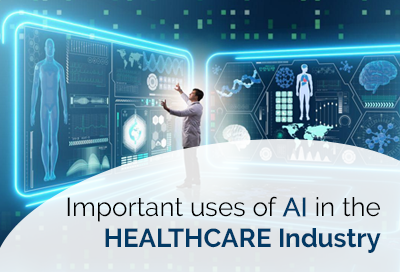
Artificial intelligence is getting progressively sophisticated at doing what people do, yet more effectively, more rapidly and at a lower cost. The potential for both AI and robotics in health care services is vast. Just like in our everyday lives, Artificial intelligence and robotics technology are progressively an aspect of our medical care eco-system. The market estimation of AI in the health care industry is anticipated to reach $6.6 billion by 2021. AI is increasingly developing in prominence throughout many industries. The vast majority of us associate AI with things like robots, Alexa and self-driving vehicles. But AI is significantly more than that. Artificial intelligence specialists consider it to be a progressive innovation that could profit numerous ventures.
The effect of AI in the health care sector is really life-changing. It is driving advancements in clinical operations, drug improvement, surgery and data management. Artificial intelligence innovation is additionally quickly finding its way into hospitals. AI applications are centred on three primary speculation areas: digitization, diagnostics and engagement. Looking at a few examples of AI in healthcare market, it is clear that there are exciting developments in incorporating AI in the health care system. Let's explore a portion of the astounding utilizations of AI that are revolutionizing health care industry. Have a look!
Here Are 5 Ways Artificial Intelligence Will Change Healthcare Industry
1. Speeding Up Automating Routine Tasks
A lot of doctors' day by day work incorporates repetitive, low-level tasks which could be immediately taken on by AI. Inspecting medical images, including CT scans and X-rays, as well as lab tests are an entire day's activity. However, these errands might one be able to day be moved operations to AI in most cases. Human experts would just need to look at those cases which are out of the ordinary, something that the machine is not able to classify.
2. Clinical Diagnosis
AI calculations, analyze ailments quicker and more precisely than doctors. They are especially effective in identifying illnesses from image-based test outcomes. Effective treatment of cancer intensely relies upon early recognition and preemptive measures. Specific sorts of disease, for example, various kinds of melanoma, are hard to find during the early stages. AI algorithms can check and analyze biopsy images and MRI scans multiple times quicker than the doctors.
3. AI & Virtual Nurses
Nurses perform a lot of low-level routine tasks, which have any kind of difference to a patient's wellbeing yet don't need exceptionally specialized skills. For instance, reminding patients to take their medicine on time can have an important impact on the treatment proficiency, and this is something that can be handled by AI on the patient's cell phone or on a companion robot.
4. Developing New Medicine With AI
Most of the time, making new medications can take years and cost billions. Preparing a neural network with the aftereffects of past endeavors can manage the way toward finding new medicines and speed up the medication determination process. AI healthcare can rule out the need to test each combination and provide the accurate result for creating new drugs.
5. Treatment Design & Precision Medicine
On the other hand of the medical care range from general diagnosis, artificial intelligence healthcare can help make personalized treatment plans. By looking into a patient's clinical record, conducting lab tests, even by utilizing gene analysis. An AI system can recognize potential threats for this patient and recommend a treatment plan. Personalized, precision medication is another method of providing care. Rather than distinguishing general solutions and making a patient fit a profile. It looks at a patient's problem first and after that find the correct solution.
We can expect improvements and new applications as this astonishing innovation keeps on progressing with time. The improvements of AI won't just be in the health care industry, but in different areas also.